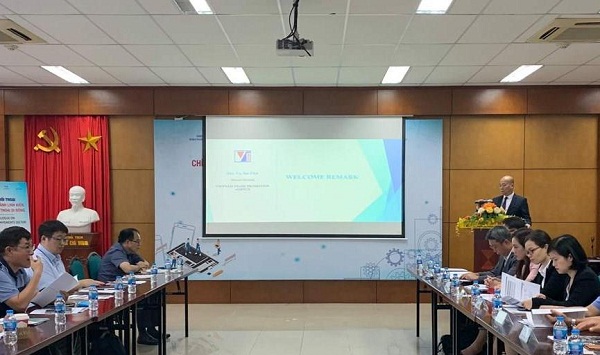 Economy
Economy

The success of Samsung in Việt Nam has lured a series of South Korean enterprises wishing to capitalise on rising demand for electronic components, an official said.

|
| Việt Nam Trade Promotion Agency (VIETRADE) and South Korea Trade Investment Promotion Agency (KOTRA) co-organised the seminar, theme “Policy dialogue on Mobile Phone Components sector” on Wednesday in Hà Nội. — VNS Photo Linh Anh |
HÀ NỘI — The success of Samsung in Việt Nam has lured a series of South Korean enterprises wishing to capitalise on rising demand for electronic components, an official said.
“This offers an opportunity for businesses of the two countries to form a sustainable value production chain in the electricity and electronic sector, especially mobile phone components sector,” said Lê Huyền Nga, Head of Investment Promotion Department, under the Foreign Industry Agency, at a seminar late Wednesday in Hà Nội.
Việt Nam Trade Promotion Agency (VIETRADE) and South Korea Trade Investment Promotion Agency (KOTRA) co-organised the seminar, themed “Policy dialogue on Mobile Phone Components sector”.
VIETRADE said the event aimed at creating an in-depth dialogue channel to support South Korean investors who wish to invest in Việt Nam, creating an exchange and connecting platform for trade co-operation among businesses of both sides, greatly contributing to further promoting bilateral trade and investment relations between the two countries in the future.
“Việt Nam's fledgling electronics industry, including mobile phone components, has been flourishing in recent years,” Nga said.
By the end of August this year, exports of mobile phones and its components reached US$31.58 billion, down 5.4 per cent over the same period in 2019. That of computers and electronic components totaled $27.73 billion, up 25.3 per cent year-on-year.
“The localisation rate of the electrical home appliances industry in Việt Nam stays at a high level of 35 per cent. Some businesses can even make high-tech mobile phone components or finished-products such as Viettel and Vsmart,” Nga said.
“But the industry still reveals a certain number of deficiencies due to poor business competency, weak technological resources and limited self-supply capacity of domestic firms,” she said.
“Most high-tech electric components are produced by FDI enterprises while local firms can often only make simple details with low added-value,” she added.
To develop the mobile phone components industry, the Government has issued many policies to promote the development of the industry.
Due to the impact of COVID-19 pandemic, South Korean and Vietnamese enterprises have encountered many difficulties. However, South Korea still retained its position as Việt Nam’s leading source of foreign direct investment (FDI), said Lee Jong Seob, Director General of KOTRA.
As of August 20, the total registered investment capital of South Korean enterprises in Việt Nam reached $70.4 billion, accounting for 18.5 per cent of the total registered FDI capital poured into Việt Nam, he said.
Samsung Vietnam is a typical example of a success story of South Korean investors in Việt Nam. After 12 years since Samsung received the investment licence for a $670 million mobile phone factory in Việt Nam, the investment capital of the company has soared by 26 times to total $17.3 billion.
Samsung’s export turnover accounts for 20-25 per cent of total annual export turnover of Việt Nam. Billions of devices are shipped worldwide from six Samsung factories in Việt Nam, collecting export sales of $59 billion in 2019, he said.
Việt Nam is currently Samsung's largest overseas manufacturing base, and Samsung has become the largest FDI investor in the Southeast Asian country. Samsung employs more than 130,000 Vietnamese skilled workers, he said.
Currently, overall investment is slowing down worldwide, but many South Korean companies are considering investing in Việt Nam to diversify production facilities, said Lee Jong Seob.
Vũ Bá Phú, VIETRADE Director, said over the past years, the agency had co-ordinated with KOTRA to organise many trade promotion activities between the two countries in order to research market needs as well as exchange experiences with investment partners.
At trade-investment promotion events held in South Korea, South Korean businesses expressed their interest in investing in Việt Nam, studying the market as well as capitalising on the production potential of Vietnamese enterprises, Phú told Việt Nam News.
Currently there are about 8,900 South Korean businesses investing in Việt Nam, employing over 1 million employees and contributing about 33 per cent of Việt Nam's total export value.
South Korean FDI has a spillover effect on many economic sectors in Việt Nam such as agriculture, tourism and services. — VNS




